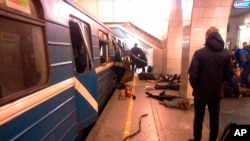Russian authorities have identified a suspect in Monday's deadly subway bombing in St. Petersburg, the Interfax news agency reports.
Interfax says police believe it was a suicide bombing, and they identified the alleged bomber as a 23-year-old man from Central Asia.
The news agency quotes police who say he carried the bomb aboard the train in a backpack.
No one has claimed responsibility for the attack in Russia's second-largest city that killed at least 11, injured 50 and was powerful enough to blow a hole through the thick medal doors of a subway car.
Russia's REN-TV showed dead and wounded lying on a station platform, as horrified passengers rushed by, many of them covering their faces to avoid the thick smoke.
Police defused another bomb hidden inside a fire extinguisher at a second St. Petersburg station. The city's entire subway was shut down for much of Monday. Moscow took what it called "additional security measures" on its metro.
WATCH: Short Instagram video from inside metro station
Officials in St. Petersburg have declared three days of mourning. Russian President Vladimir Putin was in his hometown of St. Petersburg on Monday for a meeting with Belarusian President Alexander Lukashenko. Putin brought flowers to the subway station, where a memorial of flowers and candles grows.
U.S. President Donald Trump called the blast an "absolutely terrible thing," while a spokesman for U.N. Secretary-General Antonio Guterres said "those responsible for this appalling act must be held accountable."
A terrorist attack would be quite serious, says the director general of the Russian International Affairs Council, Andrei Kortunov. "Because we have not experienced anything like that for a long period of time in Russia. And, definitely, we are back to where we were some 10 or 12 years ago when these explosions unfortunately took place on a more or less regular basis," he said.
The last subway attack was in Moscow in 2010, when female suicide bombers connected to an Islamist insurgency in Chechnya were blamed for killing at least 33 people. Earlier bombings on the Moscow metro in 2004, also linked to Chechen terrorists, killed nearly 50 people.
"Obviously, the North Caucasus is still a mess and there is always the sort of risk of terrorist attacks emanating from there," said Mark Galeotti of the Institute of International Relations in Prague, speaking via Skype. "But certainly the Federal Security Services' own assessments are, what they are particularly concerned about, is exactly some kind of connection with fighters, Russian fighters, who have joined Islamic State. What happens when they return? So, it could be that."
In Photos: St. Petersburg Metro Explosion
It would be the first time in recent memory that such an attack happened in Russia's second-largest city.
"Somehow, St. Petersburg was lucky to avoid such things," said Kortunov. "Of course, terrorists usually target the capital because it might give them high exposure. So, it sets a precedent."
Added Galeotti: "This could be the start of a trend or it could be a one-off. I think the key thing is, given that we will now probably see quite a stepping up of security in the short-term, if there are still more attacks, then I think this does spell exactly what the security services have been worried about, which is actually a resurgence of terrorism. If it's just a one-off attack, though, probably things will quite quickly get back to normal."
Unlike previous incidents of suspected terrorism, Russian state media were quick to report details of the blast in St. Petersburg.
"They learned a lesson, which is precisely by not covering stories all they end up doing is actually as it were, handing the narrative to rumor, gossip and Twitter," said Galeotti. "By actually reporting quickly and reporting fairly and honestly, actually what they do is they slightly tamp down potential panic and they sort of make sure that people are not automatically assuming that they're not being told most of the story."
Regarding Putin’s presence in the area, Kortunov said, "Definitely, it could be connected because his presence there got a lot of media coverage. And, I think that though terrorists cannot target the president directly, but it is clearly a message for the president of the Russian Federation if it, indeed, was a terrorist attack."
Putin and Lukashenko expressed condolences to the relatives of the victims.
"Certainly, all causes are being considered, both common crime and manifestations of terrorism," Putin said as the two men met. "The investigation will soon provide all answers to what has happened."
VOA’s Kenneth Schwartz contributed to this report.






